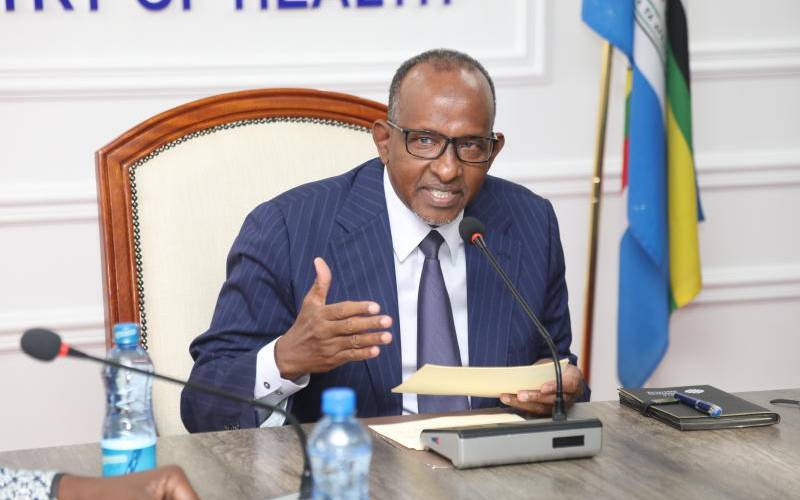
Health Cabinet Secretary Aden Duale during official launch of Benefits Package and Tarrifs Advisory Panel on May 26, 2025. [Wilberforce Okwiri, Standard]
Biometric identification will now be mandatory for all Kenyans seeking care under the Social Health Authority (SHA) after Health Cabinet Secretary Aden Duale announced the nationwide rollout of the new system.
The technology, which replaces one-time passwords (OTP) and physical documents, is already operational in Level 4, 5 and 6 health facilities and is being extended to Level 2 and 3 centres.
Duale said the move is part of efforts to eliminate fraud and streamline access to healthcare under Kenya's universal health coverage (UHC) programme.
"This innovation will secure access to health services without the need for physical documents. It will eliminate fraud, reduce paperwork, shorten queues and allow more time for patient care," explained Duale.
The CS was speaking on Monday, August 4, during the launch of four SHA digital platforms at Kenyatta University Teaching, Referral and Research Hospital (KUTRRH).
He noted that SHA will no longer accept OTP-based authorisations, and that all pre-approvals must now be processed through biometric health ID or the newly launched Practice 360 mobile application.
"This will curb unauthorised sharing of pre-authorisation codes. Practice 360 allows health workers to view, approve and manage claims and services in real time," he observed.
- SHA: Patients' one-year pain, scandals and unpaid claims
- Duale unveils Sh5.4b bailout and anti-fraud drive for Taifa Care rollout
- Government to pay Sh5.3 billion NHIF arrears to hospitals
- Private hospitals warn of collapse as Social Health Authority delays payments
Keep Reading
SHA has registered 25.1 million Kenyans and contracted nearly 10,000 public, private and faith-based health facilities across the country.
The Ministry of Health has also activated a National Product Catalogue integrated with the Pharmacy and Poisons Board (PPB), ensuring only authorised and approved pharmaceutical products are administered.
"Pharmaceutical companies have 30 days to upload certified product data or face deregistration," warned Duale.
He added that SHA will only reimburse for drugs actually dispensed. If a facility lacks stock and prescriptions go unfilled, no payment will be made.
"We have provided enough resources to Kenya Medical Supplies Authority (KEMSA). Facilities must stock enough drugs, there is no excuse," he noted.
Kenya has also launched a Health Information Exchange System (HIES) that enables real-time, secure data sharing between hospitals, counties and the national SHA platform.
"Connected facilities no longer need to submit physical documents. This will eliminate duplicate claims, repeated tests and billing fraud," said Duale.
To tighten oversight, 24 counties are transitioning to digital hospital information systems, with full digitisation in all public hospitals expected by November.
"Every patient encounter from diagnosis to prescription will be recorded and tracked in real time," he explained.
The government has also launched the Afya Yangu mobile app and web portal, allowing Kenyans to access their health records, SHA coverage details and search nearby facilities.
Duale added that a drug track-and-trace system is being developed to monitor the movement of pharmaceutical products from manufacturers to patients in line with the Digital Health Act.
"Once live, this system will ensure every tablet reaches the patient," he stated.
He directed the Kenya Dentists and Practitioners Council (KDPC) to use digital tools to identify and deregister fraudulent or non-compliant facilities under the Taifa Care network.
"Patient safety and public trust are non-negotiable. Violators will face decisive action," warned Duale.
Since inception, SHA has reimbursed Sh47.5 billion under the Social Health Insurance Fund (SHIF) and another Sh6.9 million through the Primary Healthcare Fund (PHF).
KUTRRH alone has claimed Sh1.4 billion, with Sh1 billion already reimbursed.
 The Standard Group Plc is a multi-media organization with investments in media
platforms spanning newspaper print
operations, television, radio broadcasting, digital and online services. The
Standard Group is recognized as a
leading multi-media house in Kenya with a key influence in matters of national
and international interest.
The Standard Group Plc is a multi-media organization with investments in media
platforms spanning newspaper print
operations, television, radio broadcasting, digital and online services. The
Standard Group is recognized as a
leading multi-media house in Kenya with a key influence in matters of national
and international interest.











